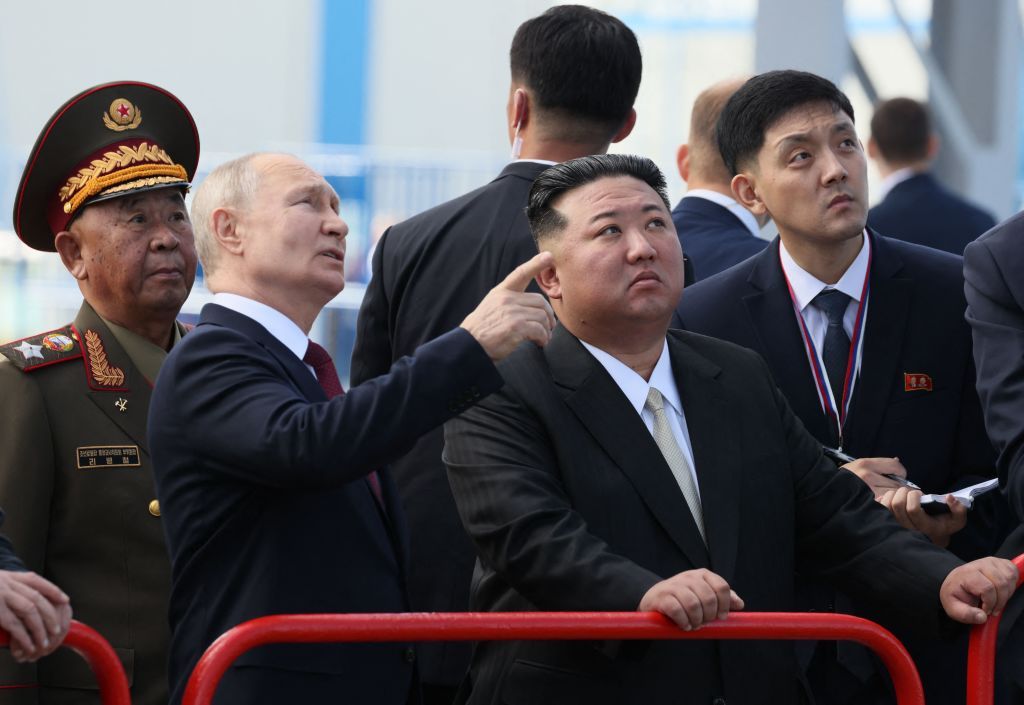A recent development in international relations has raised concerns about the strengthening alliance between Iran, North Korea, and China, which have become significant military suppliers to Russia amidst its conflict with Ukraine. The first official talks between North Korea and Iran in almost five years were reported by state-run media in Pyongyang, indicating a deepening of ties between the two pariah countries. Western officials suspect that Iran and North Korea have been supplying military hardware to Russia, although the exact nature of the exchange remains unclear. There are fears that Russia may be assisting North Korea with its ballistic missile program and even providing support for nuclear technology development in both Iran and North Korea. The concerns are significant not only for regional stability but also for the global security landscape.
In a troubling development, the White House revealed that North Korea had delivered over 1,000 containers of military equipment and ammunition to support Russia’s war against Ukraine. Satellite images tracked the movement of these containers from North Korea to Russia, raising alarms about the extent of collaboration between these countries in fueling the conflict. The transfer of military equipment signifies a dangerous escalation in the conflict and underscores the complex web of relationships between Iran, North Korea, China, and Russia that pose a threat to international security. The implications of such cooperation between these countries extend beyond the immediate conflict in Ukraine and have wider ramifications for global stability.
The involvement of North Korea in supporting Russia’s military campaign in Ukraine highlights the disruptive influence of rogue states on international affairs. North Korea, long isolated and sanctioned by the international community, has found common cause with Iran and other actors seeking to challenge the existing world order. The alliance between these countries poses a direct challenge to the established norms of global diplomacy and security, with potential implications for the balance of power in various regions. The emergence of this new dynamic underscores the need for vigilance and coordinated efforts to address the threat posed by these collaborative efforts.
The revelations about the exchange of military equipment and possible technology transfers among North Korea, Iran, and Russia have underscored the urgency of addressing proliferation risks at a global level. The unauthorized transfer of weapons and technology among states with questionable intentions undermines efforts to maintain peace and stability in conflict-prone regions. The potential implications of nuclear technology transfers and ballistic missile cooperation raise red flags for the international community, prompting calls for increased monitoring and enforcement of sanctions to prevent further escalation of the situation. The interconnected nature of these relationships necessitates a comprehensive approach to address the root causes of proliferation and ensure accountability among all parties involved.
Amidst concerns about the implications of the Iran-North Korea-Russia alliance, there is a growing recognition of the need for collective action to curb destabilizing activities and uphold international norms. The United States and other Western powers have voiced their concerns about the potential consequences of continued collaboration between these countries, emphasizing the importance of diplomatic engagement and strategic deterrence to address threats to regional and global security. The escalation of tensions in Ukraine and the broader implications of the Iran-North Korea-Russia alliance have underscored the need for a unified approach to counter destabilizing actions and uphold the principles of non-proliferation and peacekeeping. International cooperation and coordination will be critical in addressing the complex challenges posed by the evolving dynamics of global politics.
In conclusion, the evolving alliance between Iran, North Korea, and Russia has raised significant concerns about the implications for regional stability and global security. The transfer of military equipment, technology, and possible collaboration on nuclear capabilities among these countries poses a direct challenge to international norms and highlights the need for enhanced monitoring and enforcement mechanisms. The complex web of relationships between these actors underscores the importance of a coordinated and proactive approach to address proliferation risks and prevent further destabilization in conflict-prone regions. As the diplomatic landscape continues to evolve, it will be crucial for the international community to remain vigilant and responsive to emerging threats, working together to uphold the principles of peace, security, and non-proliferation.















